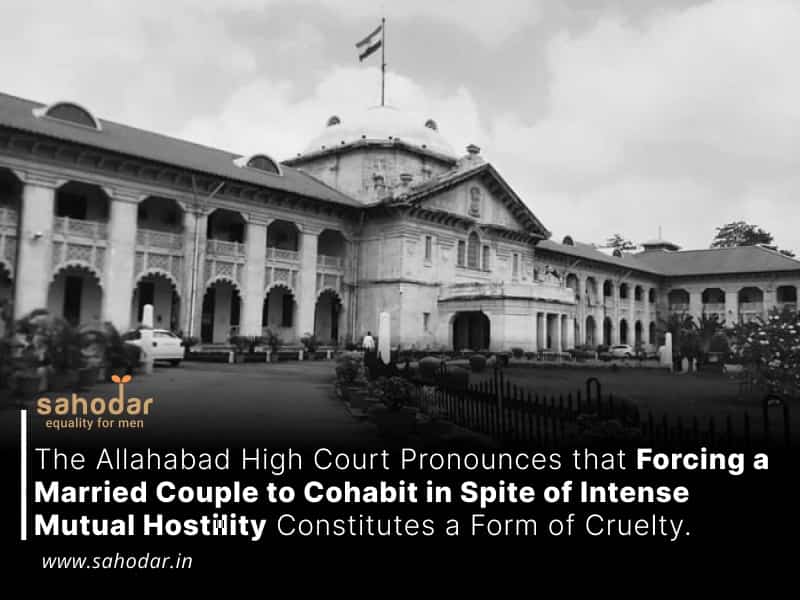The Court also noted that the spouses had been living separately for over ten years. While granting the divorce, the Court directed the husband to pay ₹1 crore as permanent alimony within 3 months.
In a recent court case, Ashok Jha v. Pratibha Jha, the Allahabad High Court stated that making a separated husband and wife live together, even if they strongly dislike each other, is cruel. Justices Saumitra Dayal Singh and Arun Kumar Singh Deshwal also said that this could be worse for the public than letting them get a divorce.
“Both parties have lodged criminal cases against each other and have serious disputes about the properties. Apart from this, both parties are also making allegations against each other of having relationship outside of marriage, therefore, forcing them to live together despite their intense hate towards each other will amount to cruelty,” the Court noted.
The Court, in the matter of an appeal lodged by the husband contesting the dismissal of his divorce petition by a family court on November 7, 2019, issued an order directing the husband to disburse a permanent alimony of ₹1 crore to his wife within a three-month timeframe. It was further stipulated that in the event of any delay in this payment, an annual interest rate of 6% would be levied from the date of the judgment until the actual payment.
The husband and wife, who entered into wedlock in 2002, initially saw the husband obtain an uncontested divorce decree in 2016. Nevertheless, the wife subsequently sought the reversal of the divorce decree, and this request was granted.
Consequently, the divorce petition was reinstated, and both parties presented their respective contentions before the family court. The legal representative for the husband argued that the wife had falsely implicated him in criminal cases, leading to his eventual acquittal. Furthermore, it was contended that these unwarranted accusations, coupled with additional legal conflicts, had inflicted emotional distress and constituted acts of cruelty.
Additionally, it was asserted that the couple had been living separately since 2014, and the pervasive bitterness stemming from these protracted legal disputes rendered reconciliation unfeasible.
In light of the specific circumstances surrounding this case, the Court took note that while the husband had not directly substantiated cruelty within their daily interactions, the wife’s actions, inclusive of the filing of baseless criminal cases and her ongoing involvement in legal disputes, were deemed to amount to cruelty.
Top of Form
“It is clear that though the appellant could not clearly establish the cruelty on the part of the respondent till filing a divorce petition in their day-to-day life, this fact is also undisputed that the respondent had lodged one case under Sections-498A, 420 506 and 507 IPC in 2014, before the filing of the divorce petition by the appellant,” the Court’s order stated.
The Court additionally based its decision on a pertinent Supreme Court ruling in the case of Naveen Kohli v. Neelu Kohli, (2006). This precedent held that the act of filing false complaints against a spouse was legally recognized as a form of cruelty.
“In the present case, both the parties have levelled allegation against each other for not maintaining the sanctity of marriage and their involvement in relationship outside of marriage and they have been living separately for more than ten years and number of complaints including the criminal complaints have been filed by the respondent against the appellant and every effort has been made to harass and torture him. Appellant had also filed a case against the respondent. Even, at this stage, respondent is not ready for any conciliation with the appellant,” the High Court added.
As a result, the husband’s application was sanctioned, leading to the dissolution of the marriage on the basis of the husband’s substantiated claims of cruelty and the demonstrated irreparable breakdown of the marital union.

